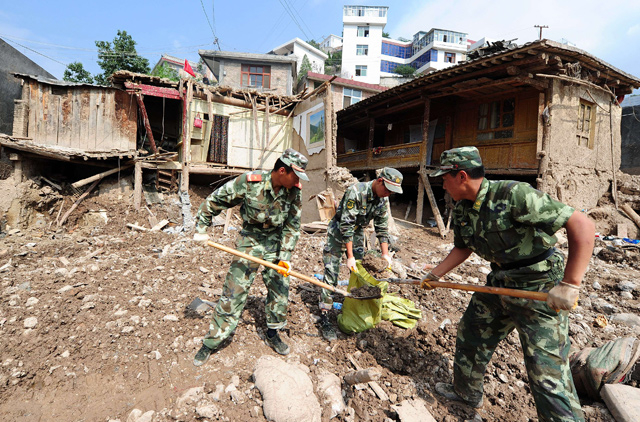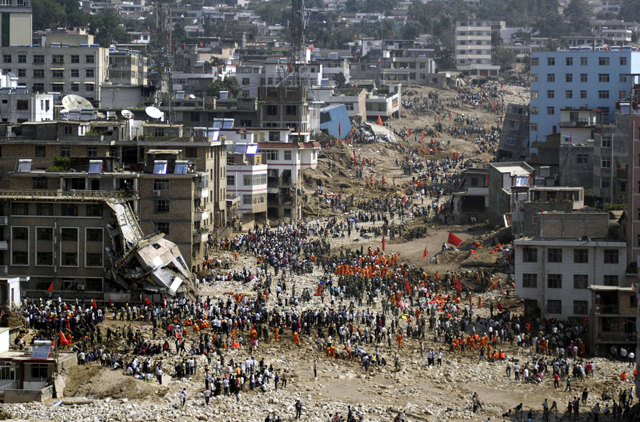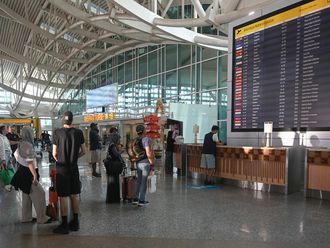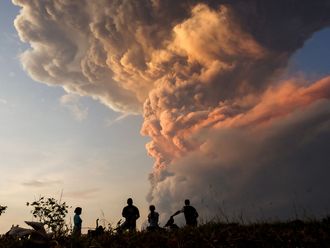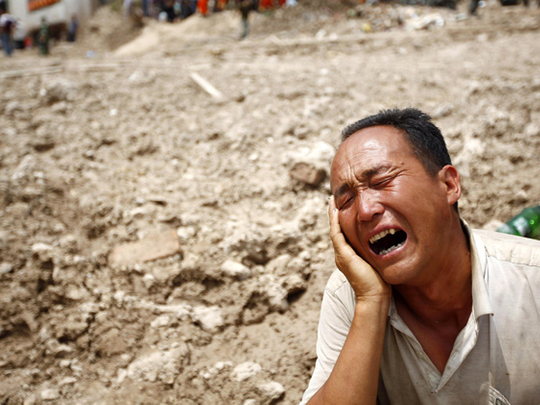
Zhouqu: Rescuers digging by hand through mud in a remote Chinese town on Tuesday found a man who had been trapped for more than 50 hours, as crew membes in three countries across Asia struggled to reach survivors from flooding that has afflicted millions of people.
The 52-year-old had been stuck inside a leveled apartment building following landslides in the northwestern province of Gansu that have killed hundreds and left more than 1,100 missing, according to the official Xinhua News Agency. Rescuers with sniffer dogs discovered the man, who was in weak condition but breathing normally.
In Pakistan, thousands of people fled a major central city as authorities warned that swollen rivers could soon submerge the area, adding to the worst natural disaster in the nation's history.
And rescuers in the desert mountainsides in Indian-controlled Kashmir recovered more bodies, with the death toll rising to 165 from flash floods.
Thousands of army and paramilitary soldiers continued clearing roads and removing the debris of hundreds of homes flattened in the Ladakh region by Friday's powerful thunderstorms.
About 200 remained missing around Ladakh, said Lt. Col. J. S. Brar, an army spokesman. With the road links being restored, nearly 300 people who fled to higher ground have returned to their homes, he said.
In China, the death toll jumped to 702 on Tuesday, after Sunday's landslides in Gansu. It was the deadliest incident so far in the country's worst flooding in a decade.
A debris-blocked swollen river burst, swamping entire mountain villages in the county seat of Zhouqu and ripping homes from their foundations.
Another survivor in Gansu, Yang Zhukai, began the sad task of making simple coffins for the 10 to 20 relatives killed by the mudslide in Zhouqu.
"These are all for relatives, for relatives killed by the mudslide. It was so unexpected--a huge landslide like this. There's nothing left. We managed to escape with our lives. As far as relatives, 10 to 20 died from my village," he told Associated Press Television News.
Throughout the area, bodies were seen wrapped in blankets and tied to sticks or placed on planks and left on the shattered streets for pickup.
The ruling Communist Party's all-powerful Politburo Standing Committee met early on Tuesday to discuss rescue and relief work, a move that will likely free up even more resources.
"It is now a critical time for disaster relief and rescue work. We must give the highest prominence to the protection of people's lives and properties," the committee said in a statement issued after the meeting.
The government said 1,148 were missing and about 45,000 were evacuated. It was not known how many of the missing were in danger or simply out of contact as workers rushed to restore communications in the area.
More rain is expected in the region over the next three days, the China Meteorological Administration said. Tents, blankets, food and water were all being rushed to the isolated area, creating traffic jams on the few roads in.
Flooding in China has killed more than 1,100 people this year and caused tens of billions of dollars in damage across 28 provinces and regions.
In one province alone, Jilin in the north, nearly 2 million people were evacuated because of flooding. Another 150,000 people were evacuated in the eastern province of Shandong along the Yellow River, which has a long history of calamitous flooding, sometimes jumping its banks and changing course entirely.
In Pakistan, two weeks of flooding have killed 1,500.
The United Nations said the government's estimate of 13.8 million people affected by the country's worst-ever floods exceeded the combined total of three recent megadisasters--the 2004 Indian Ocean tsunami, the 2005 Kashmir earthquake and the 2010 Haiti earthquake.
The UN estimates that 13.8 million people have been affected by the Pakistan flooding--2 million more than the other disasters combined. The figures include people who need short-term or long-term aid.
On Tuesday, people streamed out of Muzaffargarh, a major city of about 250,000 people in Punjab province, after authorities issued warnings using loudspeakers on mosques the previous evening. "There is chaos," said Mohammed Amir, a police official in the city.
Rescue workers have been unable to reach up to 600,000 people marooned in the northwestern Swat Valley, where many residents were still trying to recover from an intense battle between the army and the Taliban last spring, Giuliano said.
"The magnitude of the tragedy is so immense that it is hard to assess," said Pakistani Prime Minister Yousuf Raza Gilani during a visit to the central Pakistani city of Multan.
In North Korea, some 10,000 people sheltered in public buildings in the border city of Sinuiju near China because of flooding, the Red Cross said. Flash floods destroyed thousands of homes across the impoverished country, and the Amnok River recorded its highest water level in 15 years, the Red Cross said.


